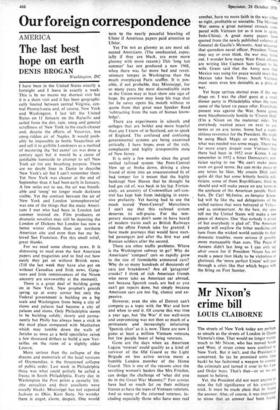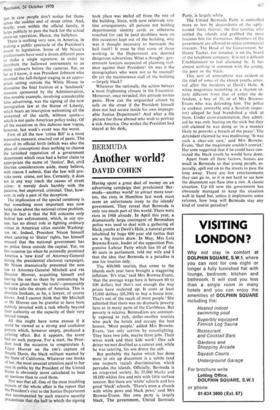Mr Nixon's crime bill
LOUIS CLAIBORNE
The streets of New York today are perhaps as unsafe as the streets of London in Queen Victoria's time. That would no longer matter much to Mr Nixon, who has moved South and West, if street crime were confined to New York. But it isn't, and the President it concerned. So (as he promised some time back) he has fashioned a weapon to combat the criminals and turned it over to his Law and Order boys. That's that—or so we are meant to believe.
Yet, the President did not want anyone to miss the full significance of his conjurers trick. It must be made plain that he found the answer. Also,.of course, it was important to stress that an answer had been found,
just in case people don't notice for them- selves the sudden end of street crime. And, finally, even within the official family, it helps publicly to pass the buck for the actual clean-up operation. Hence, the ballyhoo. There is nothing very new, in America, in making a public spectacle of the President's assent to legislation. Some of Mr Nixon's predecessors have used a dozen different pens to make a single signature, in order to distribute the hallowed instruments to as many stalwarts before the cameras. But, so far as I know, it was President Johnson who invented the full-fledged staging in an appro- priate setting outside the White House to dramatise the final fruition of a 'landmark' measure sponsored by the Administration, One notable example, involving considerable false advertising, was the signing of the new immigration law at the Statue of Liberty, which bears an inscription welcoming all the unwanted of the earth, without quota— which is not quite American policy today. Of all the occasions in this dubious new vogue, however, last week's event was the worst.
First of all the new 'crime Bill' is a most repressive measure, enacted out of panic. The situs of its official birth (which was also the place of conception) does nothing to cleanse the tarnished reputation of a government department which once had a better claim to appropriate the name of 'Justice'. But, civil liberties considerations aside, many believe, with reason I submit, that the law will pro. yoke more crime, not less. Certainly, it does not in any way reach the causes of street crime: it merely deals harshly with the putative, but unproved, criminal. That, how- ever, in only a part of the deception.
The implication of the special ceremony is that something most important was now being done about the national crime problem. But the fact is that the Bill concerns only federal law enforcement, which, in our sys- tem, has no direct role in fighting ordinary crimes in American cities outside Washing- ton Dc. Indeed, President Nixon himself when catering to 'States' rights, has himself stressed that the national government has no police force outside the capital. Yet, on this occasion (as when he pointedly promised America a 'new kind' of Attorney-General during the presidential electoral campaign), Mr Nixon dramatically presented the new law to Attorney-General Mitchell and FBI Director Hoover, acquitting himself and leaving the rest to them by announcing he had now given them 'the tools'—presumably to make safe the streets of America. This is absolute hockum, as he, a lawyer, of course knows. And I cannot think that Mr Mitchell or Mr Hoover can be grateful to have been publicly invested with a task wholly beyond their authority or the capacity of their very limited troops.
All this might have some excuse if it could be viewed as a strong and confident gesture which, however empty, produced a calming effect. But it appears, the event had no such purpose. For a start, the Presi- dent took the occasion to congratulate J, Edgar Hoover on the FBI'S capture of Angela Davis, the black militant wanted by the State of California. Whatever one thinks of her, the most unusual attention paid to her case in public by the President of the United States is obviously more calculated to heat up passions than to cool them.
Nor was that all. One of the most troubling aspects of the whole affair is the report that the President's visit to the Justice Department was accompanied by such massive security precautions that the hall in which the signing
took place was sealed off from the rest of the building. Since, with now relatively rou- tine arrangements, all persons not holding departmental identity cards or otherwise vouched for can be (and doubtless were on this occasion) kept out of the building, why was it thought necessary to barricade the hall itself? It must be that some of those working in the Department are deemed dangerous subversives. What a thought: gov- ernment lawyers suspected of planning viol- ence against their President! Or was it the stenographers who were not to be trusted? Or yet the maintenance staff of the building —largely black?
Whatever the rationale, the action betrays a most frightening climate in the Executive. Moreover, once revealed, this attitude invites panic. How can the unguarded citizen be safe on the street if the President himself does not feel secure inside his own impregn- able Justice Department? And what a file picture for those abroad who wish to portray a sick America. One wishes the President had stayed at his desk,















































 Previous page
Previous page